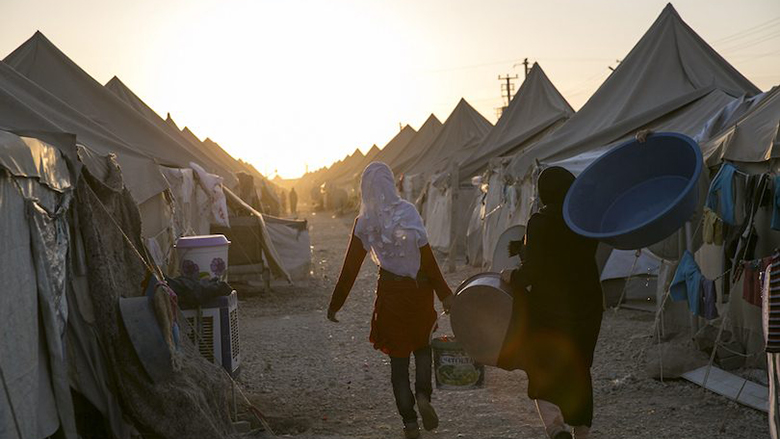
How much does it cost for a community to host refugees? What if the cost is zero?
That was the conclusion of research on Roraima, the Brazilian state hosting the bulk of displaced Venezuelans. Amid claims that refugees posed costs on host communities, the study showed the contrary: government spending on refugees was offset by their indirect tax contributions to the local economy. The findings informed UNHCR’s dialogue with policymakers in Brazil.
STORY HIGHLIGHTS
- Through its robust research output of 144 new studies, Building the Evidence on Forced Displacement, continues to inform evidence-based policymaking.
- A research partnership between the United Kingdom, the World Bank, and UNHCR, the program has also helped to make existing data more accessible
- Research supported by the program also developed a new machine-learning approach to fill the gaps in the World Food Program’s food prices series, and advanced poverty estimation methods that are now being used by UNHCR in the Ukraine, Colombia, and Bangladesh.
Delivering evidence to improve policies on forced displacement is the mission of Building the Evidence on Forced Displacement, a research partnership between the United Kingdom’s Foreign, Commonwealth, and Development Office (FCDO), the World Bank, and UNHCR. Through its robust research output - 144 new studies, many of them produced in collaboration with renowned researchers from around the world – the program accomplished its goal of helping displaced and host populations through evidence-based policymaking.
Consider, for example, the Targeting the Ultra Poor Program in Afghanistan. Due to an impact evaluation which confirmed the sustained impact of the graduation program for ultra-poor women, IDA allocated more resources to scale the program to two more provinces in Afghanistan. Five years later, a subsequent study showed that the positive impacts have remained, despite multiple crises such as: the COVID-19 pandemic and recurring, severe drought. Relative to the control group, program participants had 16% higher consumption levels and 32% higher income and revenues. In Iraq, multiple studies supported by Building the Evidence helped to shape the reform of Iraq’s social protection program.
“Tackling forced displacement has long been a policy priority for FCDO. And generating a stronger evidence base is a key part of making better policy. It is encouraging to see how this research is improving policy and practice,” said Greg Houston, Head of Migration at FCDO.
Building the Evidence marked its influence beyond policymaking. The program has helped to make existing data more accessible, resulting in tens of representative datasets on displaced and host populations in UNHCR and World Bank microdata libraries. Research supported by the program developed a new machine-learning approach to fill the gaps in the World Food Program’s food prices series, and advanced poverty estimation methods that are now being used by UNHCR in the Ukraine, Colombia, and Bangladesh to improve targeted programming. Another first by the program: the first evidence base on the intersectionality between gender and forced displacement, to enable gender-sensitive programming.
"The Building Evidence program has been catalytic. One innovative research would spark more exploration in another focus area or methodology. The results of this laboratory of ideas are policy recommendations that have the well-being of the displaced and hosts squarely in mind,” said Soukeyna Kane, Director of the Fragility, Conflict, and Violence Group at the World Bank.
Common findings emerged across the research themes – education, health, social protection, jobs, gender, and social cohesion - and prompted three areas of recommendations. Collect and use data to inform policy and programming, then promote inclusive approaches while addressing host populations’ needs. Lastly, close the gap between policy and practice.
The findings and recommendations are not as straightforward as they appear. For example:
· Collecting data can be very challenging in forced displacement contexts. Yet where researchers succeeded, such as for the examination of jobs support interventions – the data enabled critical insights. Training programs proved far less cost-effective than direct capital support to individuals.
· Rigorous evaluation is more possible than expected, including in data-constrained situations. For example, an impact evaluation of a cash reintegration assistance project to Afghan returnees from Pakistan was carried out using existing administrative data.
· Favorable policies are not enough. Countries committed to an inclusive approach must follow up policies from the national to the local level with practical measures, such as designing interventions to address the informal costs related to accessing healthcare, for example, transportation costs to healthcare facilities.
· Communication can be the missing link for successful policy implementation. In Colombia, for example, strong messaging about including migrants in national systems helped to increase enrollment of Venezuelan children and adolescents in school. In Pakistan, parents - and, at times, teachers - were not aware of the country’s inclusive policy for displaced students.
· Promote interaction. According to our research, when communities convene, social cohesion follows. In Colombia, those with less contact with Venezuelan refugees tend to support more restrictive policies. In East Africa, a study found positive effects between refugee-host interaction in urban areas and hosts’ perception of refugees. When possible, in implementing development projects, employ participatory approaches, trained facilitators, and targeted messaging stressing the benefits of hosting.
· Closing the gap between policy and practice can be as ‘simple’ as issuing documentation. Bestowing legal status can be the pathway to resilience. For example, it can reduce competition with host workers for informal jobs by allowing the displaced to find jobs that match their qualifications.
Finally, the research shows that hosting refugees brings benefits to a host community. Research from Uganda finds that, compared to non-refugee hosting areas, host communities enjoy better service provision due to more development investments. A study of Ethiopia shows that, by creating secondary occupations and triggering more demand for livestock products, refugee inflows bring substantial overall benefits to host communities. Research on specific locations in Peru found that inflows of Venezuelans led to better labor market outcomes for locals, less reported crime, improved reported quality of local services, greater trust in neighbors, and higher community quality.
Last Updated: Dec 08, 2023